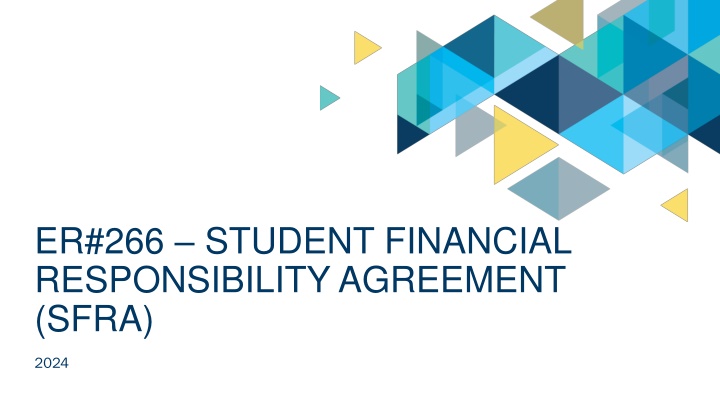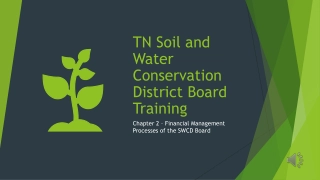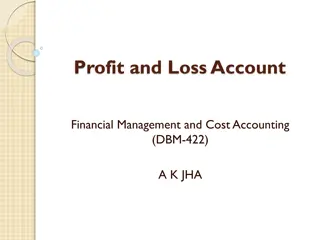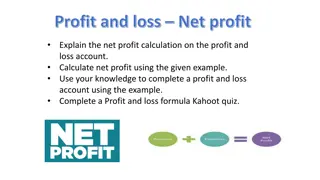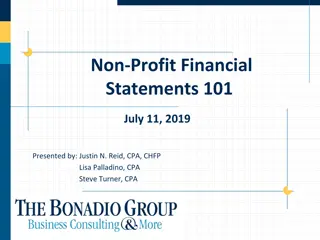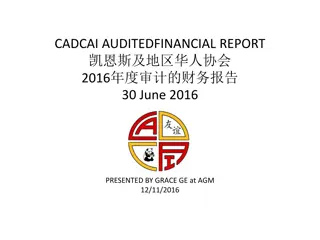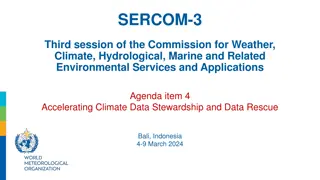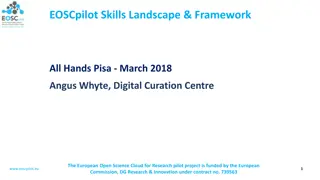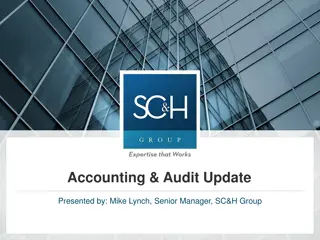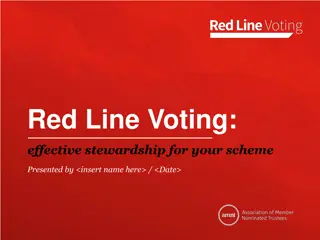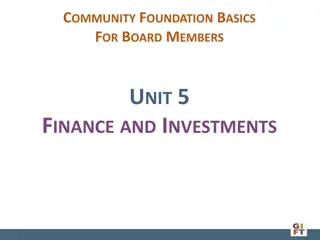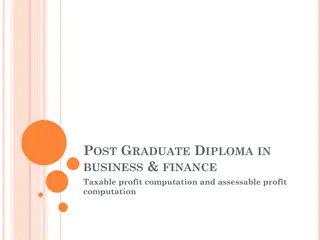Not-For-Profit Financial Stewardship for Board Members
Learn about the financial responsibilities of board members in not-for-profit organizations, including duties of care, loyalty, and obedience. Discover the key roles in financial stewardship, such as overseeing financial reports, internal controls, and risk management. Explore examples of recent challenges faced by non-profits and goals for accountability, transparency, sustainability, and ethical behavior in financial management.
Download Presentation

Please find below an Image/Link to download the presentation.
The content on the website is provided AS IS for your information and personal use only. It may not be sold, licensed, or shared on other websites without obtaining consent from the author.If you encounter any issues during the download, it is possible that the publisher has removed the file from their server.
You are allowed to download the files provided on this website for personal or commercial use, subject to the condition that they are used lawfully. All files are the property of their respective owners.
The content on the website is provided AS IS for your information and personal use only. It may not be sold, licensed, or shared on other websites without obtaining consent from the author.
E N D
Presentation Transcript
ER#266 STUDENT FINANCIAL RESPONSIBILITY AGREEMENT (SFRA) 2024
AGENDA 1. Introduction and Purpose 2. Functionality Attributes of Process 3. Resources 2
ER# 266 SFRA: INTRO & PURPOSE Introduction The implementation of a global Student Financial Responsibility Agreement (SFRA) is essential to ensure compliance with state and federal laws, mitigate institutional financial risks, and provide a consistent framework across all community and technical colleges (CTCs) in Washington. The SFRA will address the critical need for statutory compliance while enhancing the operational efficiency and consistency of financial processes within the system. Under its legislative and operational mandates, the State Board for Community and Technical Colleges (SBCTC) must establish system-wide standards where statutory compliance is necessary. Following consultations with the Assistant Attorney General (AAG), it has been determined that SBCTC will configure the SFRA globally within ctcLink to assist in compliance while simplifying administrative processes and eliminating redundancies across colleges. Purpose of a Global Student Financial Responsibility Agreement Regulatory Compliance: A standardized agreement ensures all colleges can comply with the applicable Revised Code of Washington (RCW) statutes and federal laws, as advised by the states AAG. Operational Consistency: Colleges currently have varying practices, which create inconsistencies in policy enforcement, administrative processes, and potential for financial risk. A global SFRA provides a uniform standard, enhancing system efficiency and student understanding. Risk Mitigation: Without a consistent SFRA, colleges face increased financial burden from unpaid student debts, delayed collections, and legal vulnerabilities. 3
ER# 266 SFRA: INTRO & PURPOSE Legal & Policy Basis This student Financial Responsibility Agreement is designed to comply with the following laws: 1. RCW 28B.10.293: Permitting educational institution to impose reasonable financing and late charges, as well as debt collection charges, but only if so provided for in an agreement signed by the student debtor. The statute addresses transcript holds for certain circumstances. See SSHB 2513 (2020) 2. RCW 43.17.240: Requiring state agencies and institutions to impose a financing charge of 1% a month on unpaid accounts starting on the date the unpaid account becomes past due. 3. RCW 19.16.500: Authorizing state agencies and institutions to refer delinquent accounts to a collection agency and to require the debtor to pay reasonable collection agency fees and costs. 4. U.S. Bankruptcy code, 523(a)(8): Student educational debts are generally non-dischargeable in bankruptcy without a court order based on undue hardship, but may garden-variety student debts (bookstore purchases, for example) remain dischargeable in bankruptcy unless the student signs a promissory note or other agreement to pay the debt. 4
ER# 266 SFRA: FUNCTIONALITY Key attributes of SFRA process: 1.Universal Student Agreement: All students* who are charged and may owe a balance should submit an SFRA. 2.Annual Agreement Submission: Agreements should be obtained once per academic year for each active student. 3.System Integration and Management: Agreement data will be stored and managed using the delivered functionality within ctcLink, ensuring consistent tracking and availability across all colleges. 4.College Staff Operations: College staff will have the capability to accept signed SFRA agreements and update ctcLink accordingly. 5.Support and Communication: SBCTC will host a dedicated webpage explaining the SFRA, providing resources and information for both colleges and students. ctcLink Support will provide a Quick Reference Guide (QRG.) 5
ER# 266 SFRA: FUNCTIONALITY Central attributes of SFRA process (cont.): Principles for not including a student population Extensive barrier to enrollment for populations that typically are not charged tuition/fees (BEdA, Open Doors, DOC, etc.) *Moving forward & recognizing this is a new process, we ll proceed with these exclusions as the best approach based on the information available, while remaining open to refinements as we gain more insights. Colleges are responsible for attaining an SFRA if past due balances are incurred. Reports will be if provided to identify students who are enrolled with no SFRA on file along with collection agency placement reports indicating terms the SFRA has been signed. 6
ER# 266 SFRA: FUNCTIONALITY General description of process: How will students sign the SFRA? Students using ctcLink to enroll will be required to accept the SFRA conditions prior to registration. In ctcLink, a hold blocking enrollment titled Financial Agreement Required will include a link to a page that will be used to relay the SFRA terms and conditions. Upon selecting the link, the student will be asked to accept the terms and conditions listed on the page. Upon acceptance, the student will immediately be able to register for classes. OR Students who don't use ctcLink to enroll should be required to sign a paper version of the SFRA. Upon reviewing the signed document, college staff should update ctcLink and retain the agreement for safekeeping. This agreement may be reviewed by State Auditors to ensure that manual entry of the SFRA into the system of record (ctcLink) is validated/reconciled. To update ctcLink, staff will apply a hold (service indicator) into ctcLink that will update the system to reflect a SFRA has been submitted. This hold will not impact on student services. 8
ER# 266 SFRA: FUNCTIONALITY SBCTC The State Board SF Team will be responsible for managing the below listed mass assign/release SFRA jobs in ctcLink through which most students will be processed. This task includes monitoring the jobs account for completion. Additional tasks will include updating verbiage/language and updating the activity guide as needed. 1. Mass assign job Assign newly term active students the SFRA service indicator (SFA hold) Assigns service indicator to students registered w/ no SFRA on file for academic year (fall through summer) Timing = Daily at 12:00pm & 8:00pm 2. Mass release job Releases previous term active SFA service indicators on students not registered Timing = Daily 9:00pm 3. Manual Batch Assign Agreements job Job to update ctcLink that a paper SFRA has been signed/received & assigns the activity guide (works off existence of the BFC service indicator) Timing = Daily at 8:00pm 4. Manual Batch Assign Agreement Complete Job to update ctcLink that a paper SFRA has been signed & completes the activity guide (works off the existence of the BFC service indicator) If the student has an outstanding SFA hold, this process will also be released Timing = Daily 8:30pm 9
ER# 266 SFRA: FUNCTIONALITY College Staff College staff will be responsible for updating ctcLink when paper forms are submitted, reviewing & working exception reports, and assigning/releasing service indicators. 1.Manual assign job Attain printed/signed copy of SFRA & update student s account with a service indicator of BFC Staff may enter service indicators individually or in mass via spreadsheet File SFRA paper document for save keeping (audit reviews) 2.Manual assign option 2 Assign student SFA hold to agree in ctcLink to allow student to use ctcLink for agreement 3.Manual Service Indicator Release Release SFA hold (if completed agreement is in ctcLink) 4.Reports/Queries Agreement exceptions Collection agency extracts 10
ER# 266 SFRA: FUNCTIONALITY Screenshot of student service indicator (hold): 12
ER# 266 SFRA Questions/Concerns/Comments? 15
